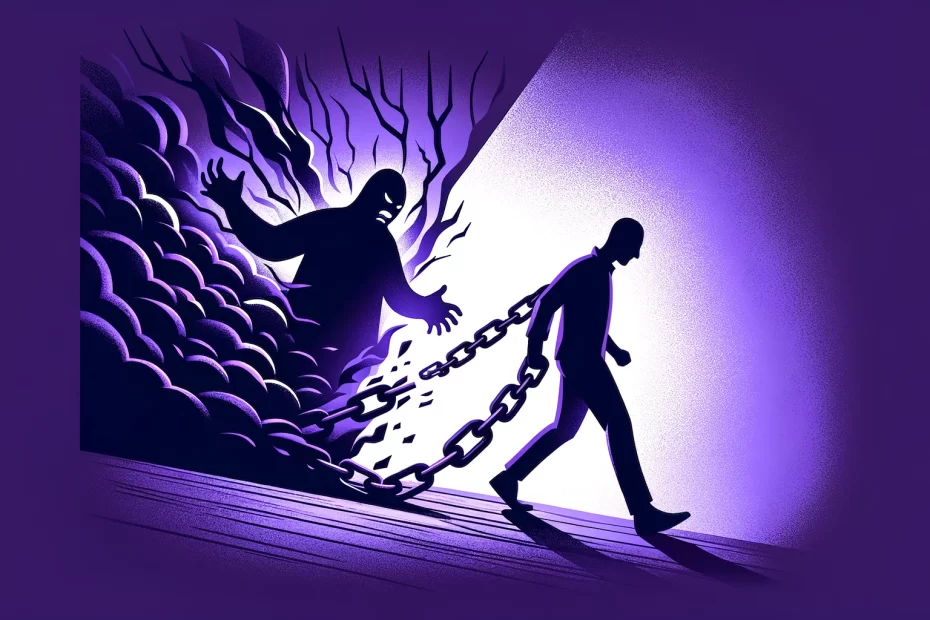Dealing with a bad boss can have a significant impact on your mental health and well-being. In today’s competitive work environment, it is not uncommon to encounter a boss who exhibits toxic leadership behaviors. The effects of such a toxic work environment can be detrimental to your emotional well-being, causing increased workplace stress and affecting your overall employee well-being.
Authoritative figures who display traits of narcissism, control, and manipulation can create an unhealthy work culture that breeds fear and anxiety among employees. The constant pressure and negativity can lead to mental fatigue, boredom, sleep disturbances, and feelings of loneliness.
However, it is important to remember that how you respond to the situation can determine the impact it has on your mental health. By adopting effective coping strategies and seeking support, you can navigate through this challenging experience and emerge stronger.
Key Takeaways:
- Bad bosses can have a negative impact on mental health in the form of fear, anxiety, and mental fatigue.
- Toxic work environments can lead to boredom, sleep disturbances, and feelings of loneliness.
- Recognizing the signs of a bad boss and their impact on mental health is crucial for employee well-being.
- Implementing coping strategies, improving workplace relationships, and seeking support from human resources are effective ways to overcome the effects of a bad boss.
- Promoting mental health awareness and fostering a positive work culture are essential for emotional well-being.
The Effects of a Bad Boss on Mental Health
A bad boss can cause fear and anxiety in the workplace, leading to a constant state of dread and worry. The type of toxic behavior in the workplace, and the unpredictable nature of a bad boss can create a hostile work environment, triggering feelings of fear and apprehension. This continuous stress and unease can be detrimental to your mental health, affecting your overall well-being and decision-making abilities.
Mental fatigue is another common effect of dealing with a bad boss. The constant pressure, unrealistic expectations, and micro-management can be mentally exhausting. The stress and strain of navigating a toxic work environment can leave you feeling drained and overwhelmed, leading to mental fatigue and burnout.
Boredom can also arise in a toxic work environment, impacting motivation and engagement. When faced with a bad boss who stifles creativity and discourages innovation, employees may find themselves disengaged and uninterested in their work. The lack of stimulating challenges and opportunities can lead to a sense of monotony and boredom, further contributing to mental strain.
Additionally, the stress caused by a bad boss can disrupt your sleep patterns and contribute to sleep disturbances. Constant worries about work, fear of retribution, or anxiety-inducing interactions with a toxic boss can make it difficult to relax and unwind. The resulting lack of quality sleep can negatively impact your cognitive functioning, clarity, judgment, and productivity.
Feeling lonely due to social isolation is another effect of a toxic work environment. A bad boss may foster an environment of mistrust and discourage meaningful connections among employees. The absence of supportive relationships and feelings of isolation can have detrimental effects on mental health, including increased stress levels, poor sleep patterns, and cognitive decline.
It is important to recognize and address the negative impact a bad boss can have on mental health. By implementing strategies to cope with fear and anxiety, managing mental fatigue, combating boredom, improving sleep hygiene, and seeking social support, individuals can mitigate the effects of a toxic work environment and promote their well-being.

Strategies to Overcome the Impact of a Bad Boss
Dealing with a bad boss can have a significant impact on your mental health and well-being. However, there are coping strategies and communication techniques that can help you navigate this challenging situation and promote your emotional well-being in the workplace.
One effective approach is to tackle fear by focusing on what you can control. By reframing the situation as an opportunity for growth and personal development, you can regain a sense of empowerment and reduce anxiety. Additionally, managing mental fatigue is crucial for maintaining emotional well-being. Staying calm, engaging in positive activities, and maintaining perspective can help you navigate the challenges posed by a bad boss.
Another coping strategy is to view boredom as an opportunity for innovation and connecting ideas. By finding ways to make your work more interesting and engaging, you can overcome the negative effects of a toxic work environment. Improving your sleep quality is also essential for your emotional well-being. Implementing sleep hygiene practices and engaging in leisure activities before bed can help you achieve restful sleep, which is crucial for overall mental health.
Cultivating workplace relationships and practicing humility can also combat the feelings of loneliness that can arise from dealing with a bad boss. By fostering positive connections with colleagues, you can create a support network that provides emotional support and a sense of belonging. Effective communication strategies are also vital in improving interactions with a bad boss. Speaking up assertively, avoiding office gossip, and choosing the right timing for difficult conversations can help you navigate challenging situations.
In addition to these strategies, seeking support from human resources and developing personalized coping mechanisms can significantly aid in dealing with a bad boss. By identifying coping techniques that work best for you and seeking professional guidance when necessary, you can effectively navigate the challenges and safeguard your emotional well-being. Ultimately, recognizing the negative impact of a bad boss on mental health and taking proactive steps to address the issue is crucial for promoting emotional well-being in the workplace.
FAQ
What are the effects of dealing with a bad boss on mental health?
Dealing with a bad boss can have a significant impact on your mental health and well-being. It can cause fear and anxiety, mental fatigue, boredom, sleep disturbances, and feelings of loneliness.
How can fear and anxiety in the workplace be managed?
Fear and anxiety in the workplace can be managed by focusing on what you can control, reframing the situation as an opportunity for growth, and seeking support from human resources.
What strategies can help overcome mental fatigue caused by a bad boss?
Strategies to overcome mental fatigue caused by a bad boss include staying calm, practicing positive activities, maintaining perspective, and developing coping mechanisms that work best for you.
What communication techniques can improve interactions with a bad boss?
Effective communication techniques include speaking up assertively, avoiding office gossip, choosing the right timing for difficult conversations, and seeking feedback from the boss when appropriate.
What role can Human Resources play in mitigating the impact of a bad boss?
Human resources can play a role in mitigating the impact of a bad boss by providing guidance, support, and resources to employees facing challenges with their supervisors.

